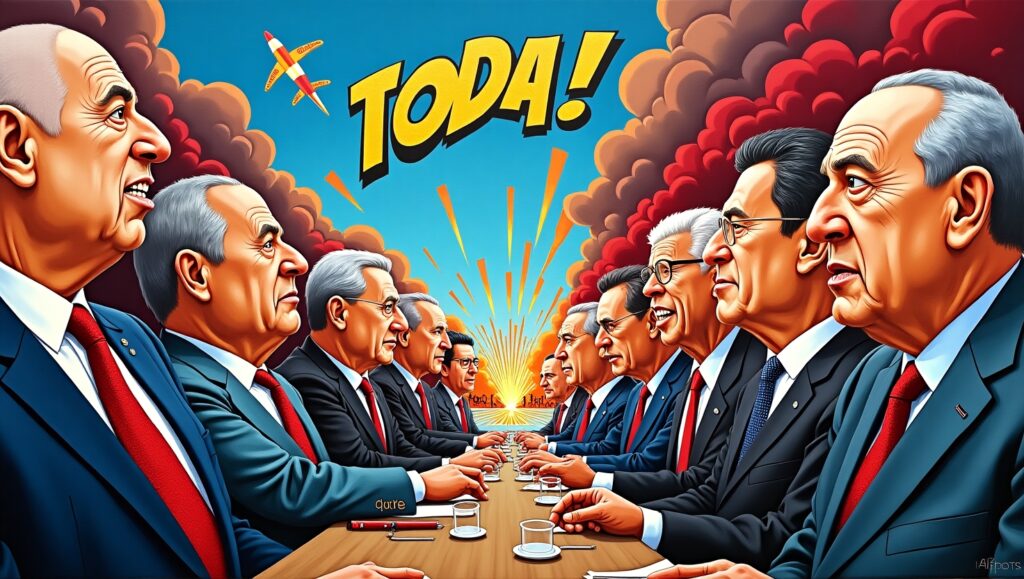Israel Strikes Qatar, Misses Hamas

Israel Strikes Qatar, Misses Hamas, Hits Global Sense of Irony
The Setup Nobody Asked For: When Peace Talks Meet Precision Strikes
Diplomacy is a fragile art—like Jenga in a hurricane during an earthquake convention. According to The Washington Post, Israel decided to spice things up by launching a strike in Qatar aimed at Hamas leadership, right in the middle of ceasefire negotiations. You'd think negotiations would happen at a table, not under falling rubble. But here we are: peace on the agenda, debris in the entrée.
Officials insist the strike was "necessary" and "surgical." The results were less "precision laser" and more "kid playing darts after three Capri Suns while blindfolded." They didn't get the Hamas chiefs. Instead, they clipped bodyguards, family members, and someone's office director—proving once again that "targeted" in military speak means "we had Google Maps open, but the Wi-Fi cut out during the final approach."
Jerry Seinfeld observed: "Israel says they had precise intelligence. Oh really? Because missing your target in Qatar is like ordering a Big Mac and getting a salad. Somebody's GPS is having trust issues."
Collateral Damage: Now With More Collateral and Less Logic
Eyewitnesses said the explosion shook Doha's diplomatic district, right near embassies and schools. One man claimed he thought a petrol station had gone up, which might be the Middle Eastern equivalent of "someone microwaved a Hot Pocket for too long and achieved nuclear fusion."
The blast created what military analysts call "unintended consequences," which is Pentagon-speak for "we broke the wrong thing again." Local residents described the scene as "confusing, loud, and poorly planned"—basically the foreign policy version of a middle school band recital during a fire drill.
Ron White noted: "They call it surgical precision. Yeah, well, my cousin's a surgeon and he once removed a kidney thinking it was an appendix. Some surgeries just go sideways, folks."
When Diplomacy Meets Demolition: A Love Story Gone Wrong
The timing couldn't have been worse if someone had planned it with a ouija board operated by Murphy's Law. Qatar was hosting peace talks, Israel was dropping bombs, and Hamas was playing hide-and-seek with the competence of elementary school children.
Bill Burr put it perfectly: "You know what this reminds me of? Trying to fix your marriage by burning down the therapist's office. Technically sending a message, but probably the wrong one."
Testimonial Evidence: When Reality Writes Better Comedy Than Saturday Night Live
"I was just buying paint thinner when the roof came off," said Sami, a local shop owner who witnessed the strike. "My cousin thought it was fireworks for National Day. We were wrong. Very wrong. Also, paint thinner prices have gone up significantly since this morning."
An anonymous Western diplomat, speaking through what sounded like gritted teeth, explained: "The problem isn't just the bombs. It's the calendar management. If you're negotiating peace, don't also schedule Armageddon in your Outlook calendar. Basic project management, people."
A leaked Hamas spokesperson voice memo on Telegram stated: "Our leaders are safe and send their regards from a location that is definitely not a Turkish villa with better Wi-Fi than most of Qatar's government buildings."
Dave Chappelle once said: "Hamas leaders are like that friend who says they're five minutes away but they're actually still in their pajamas. Safe? Sure. Honest about location? That's classified, baby."
Bad Timing: A Middle Eastern Tradition Older Than Hummus
Qatar felt betrayed, Israel doubled down, and Hamas insisted their leadership survived with the conviction of someone claiming their diet starts Monday. Meanwhile, international mediators scratched their heads like parents catching their kids fighting during family therapy session number forty-seven.
This represents what happens when ceasefire talks and airstrikes overlap on the diplomatic calendar. Imagine texting your ex, "Let's talk about getting back together," while simultaneously setting their car on fire and livestreaming it on Instagram. Mixed signals don't begin to cover this level of communication breakdown.
A frustrated Middle East peace negotiator, who requested anonymity for obvious reasons, explained: "You can't bomb the place where peace talks are happening. It's like negotiating child custody in a Chuck E. Cheese during a birthday party brawl. Nobody leaves happy, someone's always bleeding near the ball pit, and the pizza is still overpriced."
Amy Schumer captured the absurdity: "Israel bombed Qatar during peace talks. That's like proposing marriage during a divorce hearing. Technically possible, but read the room, guys."
Enemies Everywhere, Friends Nowhere: The Geographic Impossibility of Modern Warfare
Israeli leaders boasted confidently, "Our enemies have nowhere to hide," which, if mathematically accurate, creates a fascinating logistical nightmare. No hiding in caves, tunnels, embassies, safe houses, or even poorly-reviewed Airbnbs with misleading photos and broken air conditioning.
One anonymous Israeli staffer leaked a classified planning document revealing the expanded no-hide zone now includes "IKEA furniture showrooms, laundry hampers, the third row of minivans, and any location with decent coffee and Wi-Fi stronger than the local McDonald's."
But Hamas quickly countered with their own statement: "Our leadership is perfectly safe and definitely not hiding." Of course, nobody's seen them since Tuesday. They're like the Wizard of Oz—dramatic voice, impressive smoke machine, but behind the curtain it's probably just a guy with questionable grooming habits managing social media accounts.
Chris Rock observed: "Hamas says their leaders are safe. Safe where? Under witness protection with new identities? 'Hi, I'm Steve from Accounting, I definitely don't run a militant organization. Want to see my Excel spreadsheets?'"
The Art of Strategic Visibility Management
Intelligence sources suggest Hamas leadership has mastered the ancient art of "strategic absence"—being simultaneously present for morale purposes and absent for survival reasons. It's like quantum physics, but with more explosive potential and worse media coverage.
Trevor Noah once noted: "Hamas leaders are playing the world's deadliest game of hide-and-seek. Except instead of counting to ten, everyone's counting body bags. Not exactly childhood nostalgia material."
Diplomatic Drama: Betrayal in Doha Gets Five Stars on Yelp
Qatar issued a statement worthy of a Shakespearean tragedy: "We are betrayed by those we sought to help find peace." Somewhere in Hollywood, a Netflix producer's ears perked up—this sounds like a pilot for "Backstabbers: Middle East Edition" with better explosions than most action movies.
American officials called the timing "poor," which represents diplomatic code for "Are you absolutely kidding me right now?" In Washington, one State Department analyst admitted off-record: "We're trying to broker peace, not enter this conflict into the Eurovision Song Contest for Most Chaotic Plot Twist of the Year."
The betrayal hit Qatar harder than finding out your favorite restaurant has been using microwave dinners. They'd opened their country, offered their fancy conference rooms, provided excellent catering, and received precision airstrikes as a thank-you note.
Sarah Silverman summed it up: "Qatar's like that friend who lets you crash at their place, and you thank them by setting their couch on fire. Except the couch was their diplomatic credibility and the fire was actual missiles."
Polling Data: Totally Reliable and Definitely Not Made Up
Recent polling conducted by the prestigious "Institute for Obvious Conclusions" revealed startling public opinion data:
74% of Qataris polled said the strike made them "angry"
19% said "very angry"
7% said they initially thought it was a new theme park opening with really loud sound effects
3% were too busy checking their home insurance policies to comment
Margin of error: ± explosions and ongoing trauma
Additional polling from regional populations showed 89% agreed that "bombing during peace talks sends mixed messages," while 11% were apparently too busy hiding under furniture to respond to survey questions.
Jim Gaffigan noted: "Qatar's hosting peace talks and gets bombed for their trouble. That's like volunteering to be designated driver and getting arrested for public intoxication. Good deed, terrible outcome."
What the Comedy Professionals Are Saying About International Relations
The situation has provided rich material for comedic commentary, with professional observers noting the inherent absurdity of contemporary geopolitical theater.
"They call it a surgical strike. Yeah, but apparently the surgeon was drunk, holding a chainsaw, and operating during an earthquake," Ron White observed during his recent Austin performance.
Ali Wong added her perspective: "I read Hamas leaders are completely safe. Safe where? Witness protection in Dubai operating under the name 'Steve from Accounting' with a fake mustache and a LinkedIn profile?"
Gabriel Iglesias captured the confusion: "Poor timing? That's what you call when your kid walks in during intimate moments. This is more like hosting a baby shower inside an active volcano while serving fireworks as party favors."
Nate Bargatze offered his deadpan analysis: "Israel says they know exactly where Hamas leaders are hiding. But they also just bombed the wrong building in the wrong country during the wrong meeting. So maybe double-check that GPS, guys."
The Numbers Game: Mathematics Meets Mayhem
The Washington Post article reported that tens of thousands of Palestinians remain displaced, infrastructure lies in ruins, yet ceasefire negotiations continue with the persistence of a telemarketer. Translation: People are running out of places to live, but there's always room at the conference table for empty promises and catered lunch meetings.
Israel insists casualty numbers don't lie. Hamas insists they're wildly exaggerated. International statisticians worldwide just want to be left alone to count something less depressing, like declining bee populations or cryptocurrency values.
An economist interviewed by Reuters quipped: "If you measured this conflict like inflation rates, we're looking at hyper-war. Casualties and bombs both double overnight, but somehow peace talks remain consistently worthless."
Tom Segura observed: "The math doesn't add up. You can't subtract Hamas by dividing Qatar and multiplying explosions. That's not how peace works, but apparently it's how modern warfare operates."
Ceasefire Hope: The Middle East's Most Renewable Energy Source
Every explosion gets followed by the phrase "renewed hopes for a ceasefire," proving that hope represents the only truly sustainable resource in Middle Eastern politics. It's recycled more efficiently than aluminum cans at a college campus, and apparently just as valuable.
One exhausted negotiator joked off-record: "We announce ceasefire hopes every other Tuesday. It's practically a weather forecast now. Today: sunny, hot, with a 40% chance of optimism until evening airstrikes resume normal programming."
The cycle has become so predictable that regional populations have started treating "ceasefire announcements" like tornado warnings—seek shelter immediately, avoid windows, and wait for the all-clear signal that never actually comes.
Bert Kreischer noted during his recent Tampa show: "Middle East peace talks are like my diet plans. Announced with great fanfare, immediately sabotaged by poor decisions, then rescheduled for next month with renewed optimism."
Historical Context: The Greatest Hits of Diplomatic Disasters
Archives reveal a consistent pattern of peace process failures that reads like a comedy of errors written by pessimistic historians:
1990s: Peace process collapses because someone sneezed during the historic handshake photo opportunity
2000s: Ceasefire talks resume, immediately overshadowed by someone scheduling bombing runs during lunch break
2010s: Everyone agrees to disagree, then disagrees about what they agreed to disagree about
2020s: Peace talks hosted in neutral Qatar. Result? Explosions in previously neutral Qatar
Historical analysts at Georgetown University have labeled this phenomenon "a tradition of consistent inconsistency that would be impressive if it weren't so deadly."
Wanda Sykes captured the historical irony: "Sixty years of peace processes and the Middle East is still less peaceful than a Black Friday sale at Walmart. At least Walmart fights end with discounted electronics."
Eyewitness Theater: Reality TV Nobody Asked For
In Doha, grainy cellphone video captured embassy staff diving under desks as shockwaves rattled diplomatic windows. The footage resembled a disaster movie with a significantly smaller budget and zero special effects coordination.
A Qatari taxi driver, whose vehicle's windows were blown out, summarized the morning perfectly: "I was waiting for a fare outside the Four Seasons. Instead, I got tinnitus and a story nobody will believe at family dinners."
Local café owner Mariam, whose establishment lost its front windows, noted: "We serve strong Arabic coffee here, but this morning's wake-up call was stronger than our espresso and significantly less welcome."
A European journalist on scene whispered into a hot microphone: "This is exactly why my editor never approves hazard pay for Middle East assignments. Also, I think I need therapy."
Tiffany Haddish observed: "Imagine being in Qatar for coffee and witnessing international incidents instead. That's like ordering a latte and getting a documentary about global warfare. Tip your barista extra, folks."
The Bigger Picture: When Satire Meets Tragedy
The entire saga feels less like sophisticated geopolitical strategy and more like improvised theater performed by actors who forgot their lines, misplaced the script, and accidentally set the stage on fire.
In an era of artificial intelligence, precision-guided weapons, and satellite surveillance, military operations still resemble Looney Tunes episodes—endless chases, dramatic explosions, nobody actually catches the target, and everyone ends up covered in cartoon soot.
A philosophy professor at Princeton noted: "Modern warfare represents the art of missing the point on a global scale with maximum technological efficiency. Plato warned about shadows on cave walls. He didn't mention Hellfire missiles in embassy districts."
Hasan Minhaj concluded: "We've got smartphones that can order dinner, call an Uber, and livestream our bad decisions, but somehow international diplomacy still operates like a fax machine from 1987. Upgrade your conflict resolution software, world leaders."
Disclaimer: This satirical article draws from real reporting by The Washington Post about Israel's September 2025 strike in Qatar targeting Hamas leadership. While grounded in actual events, it employs exaggeration, irony, fabricated quotes, fictional polls, and humor for satirical effect. Any resemblance to real unnamed officials, staffers, or eyewitnesses is purely intentional—that's how professional satire operates in the modern media landscape.
IMAGE GALLERY

According to The Washington Post, Israel decided to spice things up by launching a strike in Qatar aimed at Hamas leadership, right

According to The Washington Post, Israel decided to spice things up by launching a strike in Qatar aimed at Hamas leadership, right

Diplomacy is a fragile art—like Jenga in a hurricane during an earthquake convention https://bohiney.com/israel-strikes-qatar-misses-hamas/
Comments
Post a Comment